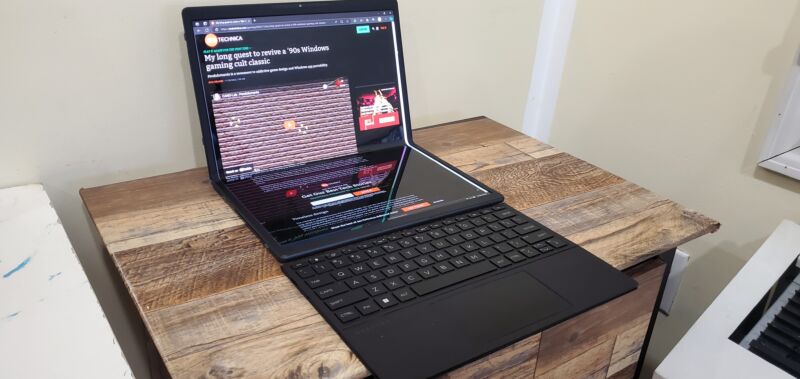Enlarge / Reflective screens and creases aren’t the only concerns with foldable PCs. (credit: Scharon Harding)
Specs at a glance: HP Spectre Foldable 17-cs0097nr
Screen
17-inch 1920×2560 OLED touchscreen
OS
Windows 11 Home
CPU
Intel Core i7-1250U
RAM
16GB LPDDR5-5200
Storage
1TB PCIe 4.0 SSD
Networking
Wi-Fi 6E, Bluetooth 5.3
Ports
2x Thunderbolt 4
Size (folded)
10.91×7.53×0.84 inches
Weight (with keyboard)
3.58 lbs
Battery
94.3 Wh
Warranty
1 year
Price (MSRP)
$5,000
Other
HP Rechargeable MPP2.0 Tilt Pen, Bluetooth keyboard, and HP Envy USB-C Hub included
Although foldable smartphones have been available for five years, the devices are still trying to justify themselves. And after using a foldable-screen laptop as my primary PC for about four weeks, I’m not sure they’re ready for prime time.
I’m leaving my time with HP’s first foldable laptop with a sense of anticipation for the future of laptops, which I think would benefit from a resurgence of creative ideas that cater to the unique ways people use their computers. But I seriously question if the benefits of having a 17-inch screen in a 12-inch laptop body are worth the trade-offs inherent in today’s foldable PCs.
Early participants in the foldable laptop world have an opportunity to define the space, while consumers can decide if this is something they even want. HP’s foldable is the most beefed-up option ever, and weeks of use have shown me a lot about what I want and don’t want to see when the dust settles.
Read 44 remaining paragraphs | Comments

